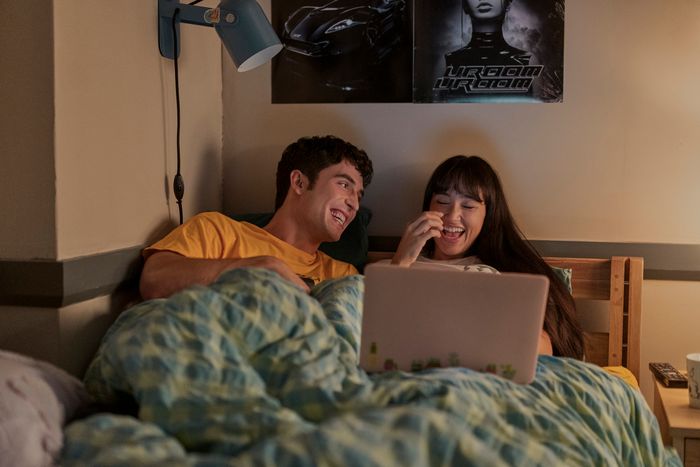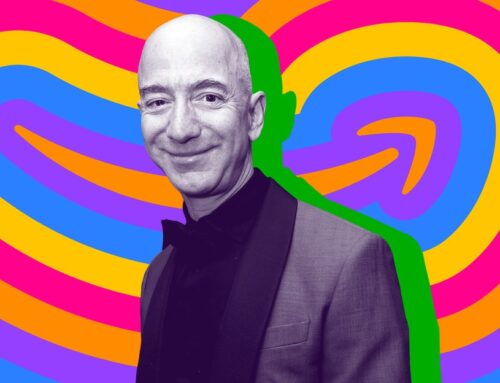When Is Overcompensating?
May 15, 2025
‘Overcompensating’ Review: When Does Prime Show Take Place?
Things you buy through our links may earn Vox Media a commission.
5:18 P.M.

Photo: Sabrina Lantos/Prime
In fairy tales, knights sometimes wander into a village that’s being held in the thrall of a spell cast around the desires of one lucky individual. Things seem ordinary enough on the surface, but look closer and inconsistencies appear. Everyone’s too happy, or maybe the seasons are out of whack, revealing that someone in town is (often inadvertently) bending reality to their will. That’s how it feels to watch A24’s Amazon Prime Video college comedy Overcompensating, a charming enough and pretty well-written show that also seems to exist in a bubble of warped space and time, simultaneously 2015 and 2025 and everywhere between all at once. Multiple times while watching Overcompensating,I paused the screeners and tried to look up when the show was taking place. Was it the present day? A throwback to the college years of the mostly millennial stars? Somewhere in between? When special guest star and executive producer Charli XCX appears onscreen, how famous is she? I asked my co-workers. They were also confused. I looked for press notes and plot synopses. No answer there either.
It’s easy to understand why the show is like this: Overcompensating stars and is built around the persona of comedian Benito Skinner, age 31, who grew up as a closeted football star in Idaho and has talked to GQ about arriving in college and “getting drunk at parties in straight boys’ houses and finding himself in fratty bathrooms with posters of aughts-era bombshells like Megan Fox and Kate Upton on the walls.” The show ports Skinner’s history into that of his character, also named Benny, also from Idaho, also posturing as obsessed with Megan Fox — his character has a pin-up poster of her in his dorm room and in fantasy sequences she talks to him and offers advice. He isn’t a Michael Bay guy, however, but is obsessed with Jennifer’s Body, the 2009 horror comedy later reclaimed as a queer classic. Other important pop-culture details about Benny: He has a sexual awakening watching Brendan Fraser in 1997’s George of the Jungle and is obsessed with “Lucky”-era Britney Spears. He also shamefully and secretly loves Glee. All of this points to a solidly young millennial upbringing, the kind of stuff I assume Skinner himself loved when he was 18. It’s also, probably, within the range of references of what I imagine would be made by people far enough into their careers to get hired in an A24/Amazon writers’ room. Further evidence: When Benny gets drunk at karaoke, his bro-y façade falls away when he starts singing Nicki Minaj’s “Super Bass,” recorded in 2010 and sent to radio stations as a single in early 2011. So, question asked and answered — this show is set somewhere around 2011. We’re in a slightly throwback universe. Look at our generation, already Lady Bird–ing ourselves.
Except. Except. It clearly is not! Overcompensating is largely devoid of references to the world outside of its fictional Yates university — a very fratty but seemingly prestigious place — but the characters’ styling and use of technology is all contemporary. The phone interfaces are up to date. You’re not seeing the bevelled text bubbles of the 2010s. There’s a passing reference to Spotify Wrapped, which launched in 2016. At one point, a character says she is excited to try out a new Alison Roman recipe. While Roman published recipes throughout the 2010s, it wasn’t until mid-2018 that she was hired by the Times, and that famous stew didn’t go viral until 2019. You’d have to assume a college student wouldn’t be referencing her by name until somewhere around then. Toxic masculinity is sadly evergreen even if the phrase itself spikes on Google Trends in 2019, but the show’s comedy about frat culture sounds as if it’s reacting to contemporary dialogues about inclusion: There are jokes about how the head of Benny’s frat — played by Adam DiMarco, 35 — is reluctantly adjusting their hazing process to be more sensitive and welcoming.
But then! DiMarco’s girlfriend, played by Skinner’s real-life pal Mary Beth Barone, 33, poses as a chill blonde popular girl but harbors a secret love of Twilight. She brings up the show while trying to reconnect with an ex-friend who has herself become a lesbian. When Malone’s character mentions Kristen Stewart, several queer girls in the background stand up in unison like dogs who’ve heard the same high-pitched noise. It’s a good joke, but it’s also where the continuum of Overcompensating collapses: You have to simultaneously believe that someone who was obsessed with the Twilight movies (released 2008 to 2012) as a teenager is interacting with people who are obsessed with Stewart as an out queer icon (2017 to present) and that all these people are the same age (18 to 22). Yes, queer women might’ve been aware of Stewart’s sexuality before she publicly came out or are just simply obsessed with her vibe, and so yes, maybe it’s possible that Malone’s character got into the movies late and those ladies got into Stewart early. But do you see the kind of mental gymnastics this show has forced me to do? Do you know how much time I spent wondering if anyone in Overcompensating had ever seen 2016’s Certain Women? Were they early to Lily Gladstone too?!
But none of these acrobatics are as exhausting to perform as the ones involving Charli XCX. The pop star, 32, is a friend of Skinner’s, as well as an executive producer on Overcompensating and the source of most of its music choices. (Charli, after last year’s Brat summer, is currently working on a bevy of screen projects with A24 and other production companies.) In one episode, she appears as herself as the act reluctantly booked to perform at Yates and sounds off on the fact that she doesn’t want to perform her early hit “Boom Clap.” If the Charli in this universe is tired of that song, we have to assume she’s at least a few years out from its 2014 release (it was notably featured on the Fault of Our Stars soundtrack), which invalidates the concept of Overcompensating as a millennial period piece.
But, curiously, the show doesn’t try to shift Charli all the way into the present. At her concert, she doesn’t perform anything from Brat, instead opting for “I Love It” (technically an Icona Pop song popularized via its appearance on Girls in 2014); “Boys” (released 2017), which provides the backdrop for a moment where Benny lusts over a tragically straight love interest (been there, bro); and yes, “Boom Clap.” That’s a setlist that could’ve come out of the period Charli was opening for Taylor Swift circa 2018. (Later on, you can hear the indistinct sound of her singing “Girls Night Out,” released 2018, as a sort of Easter egg.) But would a sorority girl of that year be obsessed with Charli to the point of trying to steal coke for her? A major aspect of Charli’s celebrity is that she labored as a pop fan’s favorite pop star for years before Brat. Would a gay guy be outing himself by saying he’s obsessed with her? Okay, yes, probably, this is eternally true of Charli fandom, but then what does it say about the straight love interest? And how do we make sense of “Party 4 U” (released 2020, revived 2025) playing over the end credits?
You could hand wave away all this inconsistency by pointing out that high-school and college television shows have always functioned like this. Teenagers on TV have looked and talked like 30-year-olds since time immemorial, or at least as far back as Aaron Spelling ruling the airwaves. It’s Riverdale core, it’s Buffy-esque — we’re working within the hallowed traditions of Greek. But what complicates things on Overcompensating is how much the show’s interest in pop culture is entwined with its take on queer awakening. Benny’s presented as an overachieving sponge, absorbing contradictory messages about how he is supposed to live in society from both masc frat culture, which tells him to repress, and the relatively more progressive music and films he’s become obsessed with, which tell him to, uh, slay.
Overcompensating understands that Benny exists in a universe where other queer guys have been able to come out without major complications (Theater Camp’s Owen Thiele plays a sort of fairy godfather to him), but also sympathizes with how he would have trouble breaking out of the tough-guy image he’s curated. Smartly, the show doesn’t let him off easy for the ways he takes advantage of the girl he pretends to hook up with for clout (played by Wally Baram, who is 28 and a really good actor). It’s a complicated set of dynamics to thread together, and Overcompensating does a pretty good job of it, while also throwing in American Pie–level humor about drinking beer out of a giant penis for a frat initiation. Still, that’s where the vagueness about time becomes all the more frustrating: If a character’s experience in the closet is so defined by the culture he’s absorbing, then that experience will transform depending on the moment in which the character exists. The college kid in the 2010s hiding his love of Nicki and Glee in the second Obama era is different from a the college kid of today queening out over Charli among the zoomers; the post-Obergefell optimism and corporate “love is love” platitudes of a decade ago does not slot neatly into the present’s chaotic mix of nihilism and traditionalism. You can imagine the experience of the closeted college football star in either. Both of those guys exist, and both are interesting figures, but they’re also very different figures, working through very different socially encoded programming. Can you please tell me which one this show is about?
When IsOvercompensating?
Things you buy through our links may earn Vox Media a commission.
You’ll receive the next newsletter in your inbox.
*Sorry, there was a problem signing you up.
Search
RECENT PRESS RELEASES
Related Post



